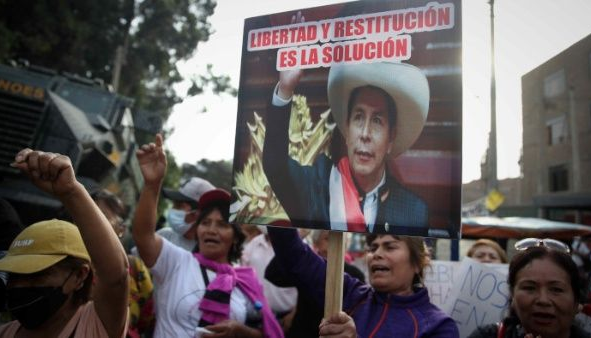
Photo: EFE
By María Josefina Arce
Peru never ceases to be in the news. Once again thousands of people demonstrated peacefully this weekend in the streets of Lima, the capital, and once again they were violently repressed by the police who beat them up and threw tear gas.
Called by peasant, civil and student organizations from Lima and other areas of the country, it was another day demanding the resignation of the appointed president Dina Boluarte, the closing of the Congress, early elections and the calling of a Constituent Assembly.
Likewise, around 80 road blockades are still active, concentrated in areas of the south of the Andean nation, where the most intense protests have been registered since December last year.
But the popular demands have not been met. Faced with the new march, the government extended the duration of the state of emergency, which, moreover, was extended to seven regions of the Peruvian territory, with the consequent affectation of constitutional rights.
The Congress, which only has a 7% approval rating, has not reached consensus on an early general election. Each bench wants to impose its own version, according to its agenda and political interests.
In addition, the possibility of a Constituent Assembly has become a bone of contention. The option has been to block until next August the debate, closing for the moment a way to open the way to put an end to the political and social crisis the country is going through.
The action was taken after the parliamentary Constitution Commission refused to debate a proposal of Boluarte to hold the presidential and legislative elections in October of this year, with the argument that it had already been discussed in several debates.
Therefore, 2026 remains as the date for the elections to be held.
Another alternative would be for Boluarte to resign from the presidency, to which he acceded after the illegal removal and detention last December 7 of the democratically elected Peruvian president Pedro Castillo.
This would mean that according to the Constitution, the president of the Congress, Jose Williams, would take over the country and call for general elections in an immediate term.
However, despite the strong demand in the streets, Boluarte has reiterated on several occasions that he will not resign and has affirmed that the advancement of the elections is in the hands of the legislative body.
Meanwhile, Peruvians continue to take to the streets and are being repressed by the forces of law and order, which has already resulted in nearly 70 deaths and numerous injuries.

